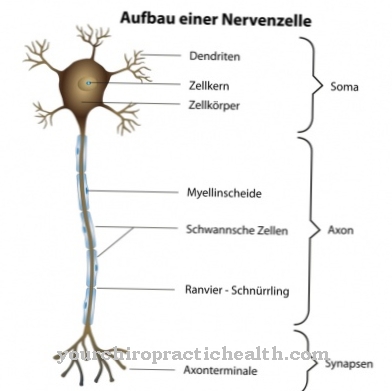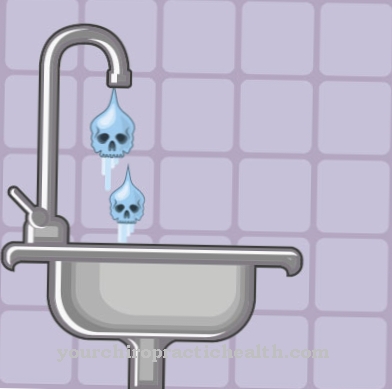Behavior disorders - also Behavioral problems called - can indicate later mental illness in early childhood. Whether they are of any treatment value is another matter. Most people will show certain behavioral disorders during their lifetime that are of a temporary nature.
What are behavior disorders?
The simplest definition of Behavior disorders is that which does not denote "normal" or inappropriate behavior. What is problematic and ethnically different is what is understood as "normal".
In Tibet people greeted each other with their tongues sticking out until 1959, here it was considered indecent and obscene. One can interpret certain behavioral disorders as warning signals or calls for help. Many behavioral disorders such as aggression, willful destruction of objects, rioting, hyperactive acting out, refusal, obscene behavior, screaming, excessive anxiety or not age-appropriate wetting without dementia are judged differently.
Therefore there are numerous more or less detailed approaches to defining behavioral disorders.
causes
The causes for Behavior disorders are diverse. They can be of a family nature and can be based on the mother's mental illness or the father's propensity for violence due to alcohol.
They can be due to school stress, constant failures, too high pressure of expectations, lack of recognition, long illness, disability or bullying, represent internal rebellion against hierarchies or are simply triggered by lack of love.
Brain damage, trauma in childhood, suppressed fears, depressing loneliness, certain physical or mental illnesses are also possible. Parenting errors can also manifest as behavioral disorders. It follows that many behavioral disorders can be treated well. Often they are of a temporary nature.
Others grow into a real problem that needs treatment. This includes, for example, cutting up your own body.
Symptoms, ailments & signs
Behavioral disorders can occur at any age. Signs are by no means clear and can be misinterpreted. Affected people direct their behavior against a common norm in their environment or in themselves. Many symptoms appear only intermittently. A difference to other mental illnesses cannot always be clearly determined.
Those affected usually suffer from internal conflicts. These are expressed in sudden and unexpected mood swings towards their environment. There is basic aggressiveness. Even small mishaps or unimportant everyday occurrences are put in a negative light. In certain phases, people work together with others in a hyperactive and extremely euphoric manner, while otherwise they live withdrawn.
Women and men with a behavioral disorder give the impression that they are not at peace with themselves. They often fail to attach meaning to their life and feel inferior. Their existence is characterized by fear of new things and changes. Some sufferers sleep poorly, which is not surprising in view of the constant inner restlessness.
The abnormal behavior ensures that generally applicable standards are not observed. Eating disorders or excessive consumption of alcohol are the last consequence. Some patients find it difficult to focus on achieving personal and professional goals.
Diagnosis & course
Diagnosis and course of Behavior disorders are usually relatively simple. Most behavioral disorders are public and can be seen by anyone. Others are secretly executed, but at some point they attract attention.
From the classifications in the ICD-10 one can see how fluid the transitions to mental disorders can be. Mental and behavioral disorders are included in the diagnosis code in
- organic and symptomatic-mental disorders
- mental or behavioral disorders due to the use of psychotropic substances
- Schizophrenia or delusional disorder
- mood disorders
- neurotic, overuse or somatoform behavior disorders
- Behavioral problems accompanied by physical symptoms
- Personality or behavioral disorders
- Intelligence impairments
- developmental behavioral disorders
- early behavioral and emotional disorders
- other mental disorders
broken down. Where behavioral disorders begin and when they are assessed as a mental health problem or illness, are different. Many behavioral disorders are not perceived as suffering by those affected. Talking to yourself, for example, is now considered normal.
Complications
As a rule, behavioral disorders always have a very negative effect on the everyday life of the person concerned and can make it considerably more difficult. Especially in children, these disorders lead to a significantly delayed development and continue to cause symptoms in adulthood. Bullying or teasing can also occur and lead to psychological upset or even to depression.
The patients often suffer from feelings of anxiety, even from ADHD or from concentration disorders. Furthermore, there is often an inner restlessness, so that those affected are very irritated and appear restless, dull, nervous. Mood swings or personality disorders can also occur due to the behavioral disorders. Parents are also affected by psychological complaints or depression in behavioral disorders and often also need treatment.
The further course depends very much on the exact disturbance and its severity. In severe cases, however, behavioral disorders are treated in a closed clinic. There are no complications with the treatment itself. The symptoms can be resolved with the help of various therapies or medication. Complete healing cannot be predicted.
When should you go to the doctor?
People who continuously show behavior above the norm should consult a doctor for an observation and assessment of the situation. Problems in social relationships, inappropriate reactions or recognizable emotional overstrains are signs of impaired health. If those affected and their relatives feel clearly overwhelmed when dealing with one another, it is advisable to consult a doctor. Help is needed in the case of self-destructive actions, permanent conflict situations in everyday life, insults or disorders of concentration. If a regular daily routine cannot take place, if social obligations are not complied with or if the person concerned shows an exaggerated reckless and dangerous demeanor, a doctor should be consulted.
Tantrums, strong tearfulness, poor hygiene and a lack of empathy indicate a disorder. Loss of control, breaking existing rules and agreements that serve to improve organization in everyday life, as well as language abnormalities are also complaints that should be investigated.
If there are disorders of voluntary movement or sleep, this is to be understood as an alarm signal from the organism. If the abnormalities occur suddenly, there are mostly acute disorders that require action as quickly as possible. Since it is a characteristic of behavioral disorders that the person concerned is not aware of his or her actions, relatives and people from the social environment are often obliged to get help.
Treatment & Therapy
Treatment of Behavior disorders always depends on the disturbance. With ADHD children, one has to proceed differently than with a highly aggressive man who resists treatment or an alcohol-dependent woman who uses fecal language while intoxicated and occasionally develops delusions.
Talk and behavioral therapy are good approaches for many behavioral disorders. The underlying cause of the behavioral disorders must be found if the measure is to be successful. In some cases, drug treatment must be started. In others, drug or alcohol withdrawal in an appropriate clinical setting is the appropriate treatment approach. The behavioral disorders often go away if the cause is addressed.
Aggression by children after the parents' divorce or because of latent psychological disorders of the caregiver can be brought under control with family therapy, for example. In the family structure, there are many things that must not be expressed, there are taboos and laboriously suppressed things that can trigger behavioral disorders. But such things can be addressed in the protected space of family therapy.
You can find your medication here
➔ Medicines to calm down and strengthen nervesprevention
To prevent Behavior disorders contributes to a healthy, open climate in which everyone can express themselves. If behavior disorders occur, one can conduct research into the cause and try to solve the underlying conflicts together. The person who has behavioral disorders can learn other ways to deal with their conflicts and problems. Disordered children are no longer described as difficult to bring up. The problems are often deeper.
Aftercare
Behavioral disorders are a broad field and follow-up care must therefore be precisely tailored to the individual. In most cases, however, it is very important because behavioral disorders often cannot be completely eliminated by therapy and what has been learned has to be integrated into everyday private and professional life again and again.
Follow-up care can be arranged in cooperation with psychologists or the family doctor and requires the active cooperation of the patient. It is also often helpful to visit a self-help group with like-minded people. The exchange of experiences in a protected setting reduces fears and can give those affected valuable tips for coping with their behavioral disorders.
Often it is social contact that helps with behavioral disorders. Friends, colleagues and neighbors can be important in the context of aftercare, so that communication and other contact should not be neglected. In sports clubs or in adult education courses, people with behavioral disorders discover opportunities to abandon unfavorable behaviors and gradually integrate new behavior patterns into their lives.
The lessons learned from the therapy are consequently put into practice. The behavioral disorders can be further reduced and new self-confidence can be gained through successful experiences from social contacts. If behavior disorders are also linked to inner restlessness, relaxation methods such as progressive muscle relaxation, autogenic training or yoga, which are best learned in the course, often help.
You can do that yourself
Patients with behavioral disorders are often severely restricted in their everyday life by the disease. In some cases, it is no longer possible for those affected to continue their professional activity and to pursue a regular everyday life. They are often dependent on the help of relatives.
In the case of behavioral disorders, it is particularly important that those affected have a regular daily routine. Strict adherence to getting up and going to bed times as well as regular meal times are recommended. Those affected should refrain from alcohol and beverages with a high caffeine content. Nicotine consumption should be reduced if necessary. A balanced diet rich in vitamins and low in sugar is also important. Regular exercise can also be helpful. Daily morning jogging, walks or swimming are recommended. Relaxation techniques like yoga can also be effective.
Under no circumstances should those affected withdraw into solitude. Social events such as family celebrations should be attended whenever the patient can. In some cases, however, it is advisable to let relatives and friends know about the disease. Those affected and their relatives can also get help in self-help groups or in internet forums for people with mental illnesses.



.jpg)























